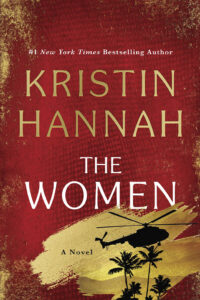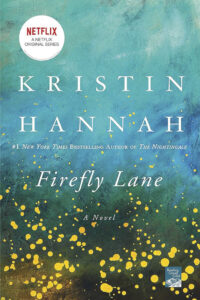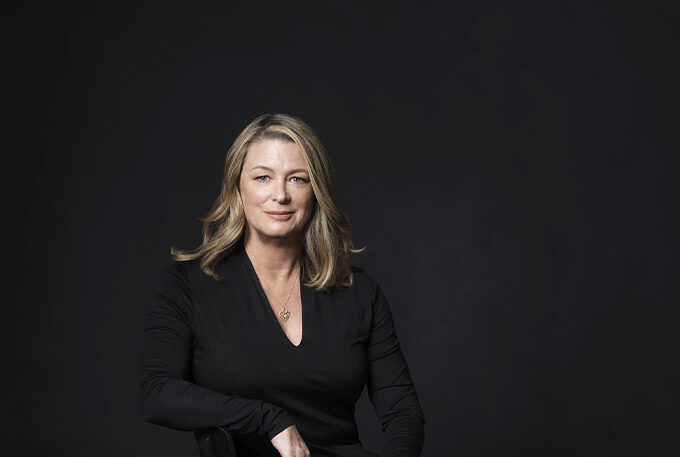Kristin Hannah is the author of more than two dozen books. Her best-selling book “The Nightingale” sold more than 4.5 million copies worldwide and was published in 45 languages. Another best-seller, “Firefly Lane,” was made into a popular Netflix series. In that book, the main character says she wants to be like TV anchorwoman Jean Enersen. So now, for me [Editor’s note: the real-life Jean Enersen], it wasn’t enough to just read her books: I wanted to meet Kristin Hannah. Our conversation about her new book, “The Women,” was our first meeting.
“The Women” centers on the heroism of military nurses in Vietnam, whose return home is as devastating for them as the war itself. Hannah’s inspiration for writing this story arose during the COVID-19 pandemic, as she observed frontline nurses lacking the recognition they deserved. She found parallels between the Vietnam War era and today’s divided society, prompting her to revisit the Vietnam narrative.

Kristin Hannah’s novel “The Women.”
JE: What compelled you to write this story and to write it now?
KH: I first pitched a story about the Vietnam War to my editor in 1997. She said, “Kristin, you’re just not ready, and the world isn’t ready to listen.” Then came March of 2020, the pandemic; I was watching the news and seeing how divided we were and seeing nurses on the frontline of the pandemic who were not getting the support and gratitude they deserved. That made me think it was time for the Vietnam book. I couldn’t go to Vietnam because of the lockdown, but the lockdown also gave me lots of time for research.
JE: You open the book with a quote about Vietnam from former U.S. Senator Frank Church of Idaho: “This war has…stretched the generation gap so wide it threatens to pull the country apart.” Did you think that idea resonates because of the polarization we see today?
KH: It’s a volatile world again today, and I think the book speaks to that. We were at this stage then, and we came out of it and came back together. We healed and moved on. It makes me hope there’s a path forward for that now.
JE: You were a young teenager when the war ended. What do you remember from that time?
KH: My best friend’s father was a pilot who was shot down in Vietnam. We all wore bracelets to remember the people who served in Vietnam. My bracelet was a physical presence of the war throughout my life. But also, as I started researching, I was lucky to meet a woman named Diane Carlson Evans, who was a nurse in Vietnam, and she became my inspiration, my mentor and my fact-checker throughout this process. She opened the door for me to a lot of veterans, men and women.
JE: You were trained as a lawyer. Does that training help in your research or your writing?
KH: You know, I think there’s a reason so many lawyers turn writers. The skill sets are similar: a lot of reading, analysis and research. Then, using the facts of the law, you make creative arguments to win your case. As a writer, I’m arguing to create a world and put you in it.
JE: What inspires you to write? What fires your imagination?
KH: I like a challenge, and I’m always looking for conflict. The challenge is to write the best novel about an idea that I can write. I will throw out hundreds of things to come up with the best version of that idea. The editing can take a whole year. Then, there also has to be conflict in the story. Creating that conflict is the magic. I don’t need burning candles or the sound of the sea to write. I’m hyper-focused and can write anywhere, anytime, always with a long hand on a yellow legal pad.
JE: Do you start with a plot or with the character?
KH: If I start with a character like Frankie in “The Women,” I list the traits, beliefs and background of the person who is representative of the story I want to tell. I create enough information for five characters to put into that one person. Then I hone it down and hone it down until I understand the backstory I want to tell. With Frankie, what was most important in the final analysis is that she begins as an innocent; she becomes hardened and cynical and then ultimately finds her voice. That’s the character arc for this book and for most of my books.
JE: How did you write your first novel?
KH: My mom and I decided to write a book together when she was in the final stages of breast cancer. She was in the hospital. I was in law school. I think it was her way of putting me on the path. A path she probably had wanted for herself but never took. She passed away, and I went back to law school and started practicing law. I worked on the book for two years but never finished it. I decided it was a very bad idea. But the process was like going to college. I learned about the marketplace, how what I wanted to say might fit in, and what was selling. Then, I finished my first published book two years later when my son was two. The book “Firefly Lane” many years later, was really my way of dealing with the loss of my mother.
For others who want to start writing, I say: Words have power. You tell yourself you are going to do this, and you sit down and do it. Don’t stop. Just keep writing. You have to be brave.
JE: I’m glad you referenced “Firefly Lane”… because, for me, it wasn’t enough just to read your books. After your character in “Firefly Lane” states she wants “to be like Jean Enersen,” the TV anchorwoman, I wanted to meet you. Today was the first time.
KH: Well, actually, this is not the first time we’ve seen each other. I was a student in a big communication class at the University of Washington, and you came to teach a class for me one day. We didn’t meet, but I saw you there.
JE: Now that we’ve met, is there anything that surprises you about the real Jean Enersen?
KH: No. What really surprises me is that it turns out we live about a mile apart in Seattle.

“Firefly Lane”
JE: What surprises me about you is that, in spite of your phenomenal writing success, you seem like the mom next door.
KH: When I was a stay-at-home mom writing during nap time, I was just hoping someday to sell a book. I could never have imagined this kind of success. It’s beyond surreal. It feels like someone else.
JE: What’s next for you?
KH: Besides advising those working to make “The Women” into a movie and hoping for the release of a movie about “The Nightingale” soon, I’ve just started a new book. It’s about Sun Valley. I’ve never been there. I’ve been wanting to go forever. We are big skiers. That’s one of the reasons I’m so excited about coming to the Sun Valley Writers’ Conference. I think Sun Valley is going to feature prominently. But I’m never sure because things change a lot in the writing of a book. So, if it’s still Sun Valley in three years, I’ll let you know.


